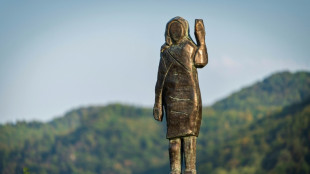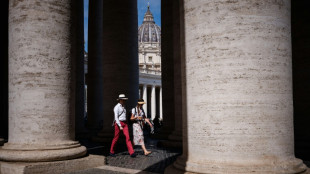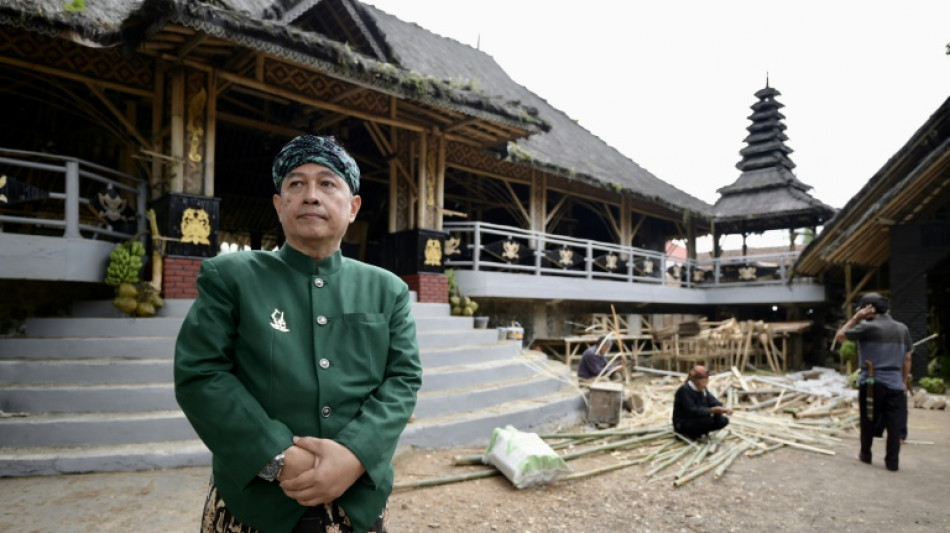
-
 Sinner demolishes Ruud as Gauff battles into Italian Open final
Sinner demolishes Ruud as Gauff battles into Italian Open final
-
Aussie Davis, American Gerard share PGA Championship lead

-
 Austrian opera, Finnish lust through to Eurovision final
Austrian opera, Finnish lust through to Eurovision final
-
Combs's ex Cassie faces intense defense questioning

-
 How Flick's Barca wrestled La Liga back from Real Madrid
How Flick's Barca wrestled La Liga back from Real Madrid
-
Kiwi Fox, local hero Smalley make most of late PGA calls

-
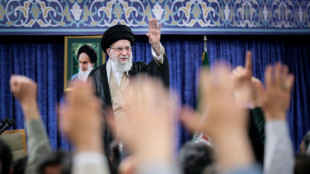 Oil prices fall on hopes for Iran nuclear deal
Oil prices fall on hopes for Iran nuclear deal
-
European walkout after late Infantino delays FIFA Congress

-
 Eurovision: the grand final line-up
Eurovision: the grand final line-up
-
Yamal pearl seals Barcelona La Liga title triumph at Espanyol

-
 Rubio has no high expectations for Ukraine-Russia talks
Rubio has no high expectations for Ukraine-Russia talks
-
Milkshakes, opera and lust as Eurovision semi votes counted

-
 Trump admin leaves door open for tougher PFAS drinking water standards
Trump admin leaves door open for tougher PFAS drinking water standards
-
No.1 Scheffler, No.3 Schauffele blast PGA over "mud balls"

-
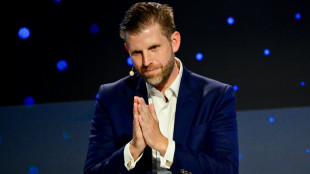 Eric Trump says father's energy policies will help crypto
Eric Trump says father's energy policies will help crypto
-
US rests case in landmark Meta antitrust trial

-
 Alba inks Inter Miami extension to 2027
Alba inks Inter Miami extension to 2027
-
Real Madrid's Asencio wants 'presumption of innocence' in underage sex video case

-
 Brazil president leads final farewell to Uruguay's Mujica
Brazil president leads final farewell to Uruguay's Mujica
-
Gaza strikes kill 120 as Hamas says aid entry 'minimum requirement' for talks
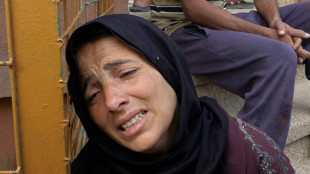
-
 Donald edges Bradley as Ryder Cup captains contend at PGA
Donald edges Bradley as Ryder Cup captains contend at PGA
-
Eurovision semi starts with milkshake and space odyssey

-
 Ruud mesmerised by 'next level' Sinner in Rome destruction
Ruud mesmerised by 'next level' Sinner in Rome destruction
-
Coinbase expects data breach to cost it up to $400 mn
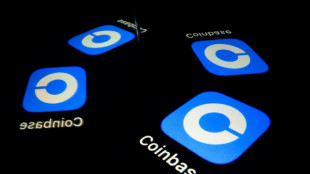
-
 Eagle chip helps Gerard grabs PGA Championship lead with 66
Eagle chip helps Gerard grabs PGA Championship lead with 66
-
England great Anderson set for Lancashire return

-
 Sinner sends message by demolishing Ruud to reach Italian Open semis
Sinner sends message by demolishing Ruud to reach Italian Open semis
-
Rubio says no high expectations for Ukraine-Russia talks in Turkey

-
 NFL owners to vote on allowing players at 2028 Olympics
NFL owners to vote on allowing players at 2028 Olympics
-
Sinner demolishes Ruud to reach Italian Open semi-finals

-
 Rashford to miss final two games of Aston Villa's season
Rashford to miss final two games of Aston Villa's season
-
70 South African white rhinos to be relocated to Rwanda

-
 West Indies issue LA 2028 Olympic cricket plea
West Indies issue LA 2028 Olympic cricket plea
-
Gaza strikes kill over 100 as Hamas says aid entry 'minimum requirement' for talks
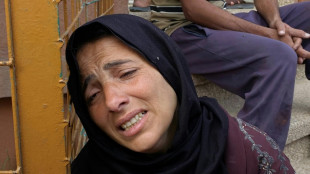
-
 Nantes striker Mohamed fined for sitting out game marking anti-homophobia campaign
Nantes striker Mohamed fined for sitting out game marking anti-homophobia campaign
-
Hamilton admits he underestimated Ferrari challenge

-
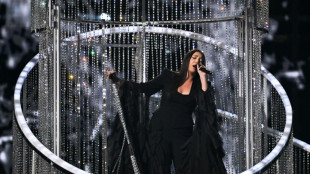 Israel in Eurovision spotlight at second semi-final
Israel in Eurovision spotlight at second semi-final
-
England's Donald shares PGA Championship lead with 67

-
 WTA president Simon to step down in December
WTA president Simon to step down in December
-
Antonelli draws on Hamilton's heart-warming message for inspiration

-
 South African rugby mourns death of Cornal Hendricks at 37
South African rugby mourns death of Cornal Hendricks at 37
-
Cool Piastri plays down prospects of more McLaren domination

-
 Hadid sister helps launch Palestinian film streaming site
Hadid sister helps launch Palestinian film streaming site
-
Groves wins neutralised Giro sixth stage, former winner Hindley abandons

-
 Knight eager to be 'one of the girls' under new England captain Sciver-Brunt
Knight eager to be 'one of the girls' under new England captain Sciver-Brunt
-
Ukraine sends team for Russia talks, downplays expectations

-
 Paolini delights home crowd by reaching 'dream' Italian Open final
Paolini delights home crowd by reaching 'dream' Italian Open final
-
Guyana says soldiers attacked in disputed border region with Venezuela

-
 Paolini delights home crowd by reaching Italian Open final
Paolini delights home crowd by reaching Italian Open final
-
Combs's ex Cassie faces intense cross-examination


Not 'godless': Indonesian native faith followers fight for recognition
As 81-year-old Subrata listened to a gong echo during a celebration of his ancient Indonesian Indigenous faith, he betrayed little of the trauma of a lifetime of discrimination deriding him as "godless".
He was enjoying a cleansing ritual for younger followers of the Sunda Wiwitan religion in Muslim-majority Indonesia's most-populous province West Java, where they are often derided as infidels, primitive or faithless idolaters.
Sunda Wiwitan believers are pushing for official recognition of their shunned faith -- which has existed longer than Islam and Christianity in Indonesia.
"I hope people will no longer treat God's creatures differently," Subrata, who like many Indonesians has one name, told AFP between rituals in Cigugur village, around 200 kilometres (124 miles) east of Jakarta.
Sunda Wiwitan believers face significant hurdles, including policies that bar them from government jobs and having their marriages officially recognised.
"I am a citizen of this country, yet I am ostracised on my land," said Subrata.
Around him, preparations were under way to celebrate Seren Taun, the annual harvest festival outlawed from 1982 until the end of Suharto's dictatorship in 1998.
Before a ritual known as "Pesta Dadung" to protect crops from ruinous pests, men dressed in black solemnly chanted prayers while lighting a fire, as women in white kebaya sang in a traditional Sundanese language.
Sunda Wiwitan venerates the spirit of followers' ancestors as well as the power of nature, causing misconceptions that they revere dead objects.
Before he retired from the civil service, Subrata said he was repeatedly denied promotions and interrogated because he was deemed "godless" by his then-boss.
"God destined me to be a believer of Sunda Wiwitan, but after I was born, I was treated differently. Of course, it hurts," he said.
Later, the government barred native faith believers from applying for civil service jobs altogether.
- Social stigma -
Despite the religion's centuries-long existence, Sunda Wiwitan followers continue to face barriers to their ability to practice their faith and access other rights.
Before 2017, more than 10 million native-faith followers were required to fill the religion field on their ID cards with a dash.
The move created several bureaucratic roadblocks for believers, including renewing driving licences, applying for certain jobs or undertaking other official administrative tasks.
In 2017, Indonesia's Constitutional Court allowed native-faith followers to fill the religion column with a generic phrase: "the Belief in God Almighty".
But bureaucratic problems remain.
Some are reluctant to renew their ID cards because they cannot state their actual religion.
"We are all different, why do we need to be lumped into one term?" asked Dewi Kanti Setianingsih, an advocate for Sunda Wiwitan rights.
Without a listed religion, people cannot register their marriages legally, forcing some women into unofficial nuptials that carry further stigma in Indonesia.
"Their children's status will not be acknowledged by the law and they will be considered as children born outside of marriages," said Setianingsih.
Followers say they face more obstacles than other religions and local authorities have also moved to shut down their tombs, citing a lack of permits.
"We are still fighting because there are still articles... that are discriminatory," Ira Indrawardana, an anthropologist at Padjadjaran University who practices Sunda Wiwitan, told AFP.
The government, however, denies discriminating against the community.
"The ministry can't provide such service for that many religions so we decided on a universal term," said Sjamsul Hadi, senior official at the Ministry of Education, Culture, Research and Technology.
- In hiding -
Sunda Wiwitan followers numbered as many as 15,000 in the early 1960s, said Setianingsih.
More precise estimates are hard to come by because many hide their faith.
As a child, Restu Buana would call himself a Catholic for fear he would be bullied if his true religion was known.
When his religious studies teacher found out, he condemned Sunda Wiwitan as a culture that "is not a religion", the 20-year-old student said.
He now settles for a dash on his ID card.
"What I want is to not have a religion column on our ID card. Religion is a private matter, whatever people practice is their right and must be respected," he said.
Some Sunda Wiwitan followers believe involving other religions in their sacred harvest rituals could help fix misconceptions.
They are also working with NGOs and religious organisations to clarify misunderstandings about their faith.
Others have lobbied the government through the rights commission, filed court requests to recognise marriages or led protests against tomb closures.
"If Indonesia wants to be seen as the beacon of diversity, it has to embrace differences," Indrawardana said.
F.Bennett--AMWN
